BioKIDS Team Members
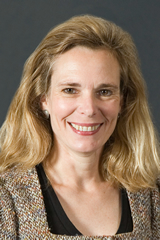
Nancy Songer, Ph.D.
Title: Professor of Education
Role: Project Director of BioKIDS and DeepThink
Background: Nancy is a member of the faculty of the School of Education at the University of Michigan. She has been designing and studying science learning environments that utilize emerging technologies to catalyze understanding for about fifteen years. She was recently elected a Fellow of the American Association for the Advancement of Science. She has a Ph.D. in Science Education from the the University of California, Berkeley, an M.S. in Molecular/Developmental Biology from Tufts University, and a B.S. in Biological Sciences from the University of California, Davis.
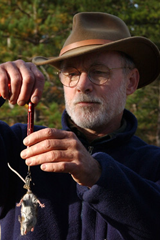
Phil Myers, Ph.D.
Title: Curator of Mammals and Professor of Ecology and Evolutionary Biology
Role: Co-Primary Investigator, oversees growth, development and use of Animal Diversity Web.
Background: Phil is a Curator of Mammals in the Museum of Zoology and Professor in the Department of Ecology and Evolution at the University of Michigan. He is also the founder and director of the Animal Diversity Web. He teaches introductory and advanced courses in animal diversity and mammalogy. His research explores issues in the ecology and evolution of mammals, especially the two most diverse groups of mammals, bats and rodents. Currently his main research project is a long-term study of shifts in mammal species distributions in the Great Lakes basin in response to climate change. He has also done extensive work on the small mammal fauna of in South America. Dr. Myers has a Ph.D. in Zoology from the University of California, Berkeley, and a B.S. in Biology from Swarthmore College.
Phil's Homepage

Amelia Gotwals, Ph.D.
Title: Assistant Professor
Role: Co-Primary Investigator, DeepThink Project. Amelia's main responsibilities are to manage the development, implementation, and evaluation of assessment tasks for BioKIDS/DeepThink's curricular units.
Background: Dr. Gotwals is an Assistant Professor of Science Education at Michigan State University. She earned her doctorate in Science Education at the University of Michigan, and a Master of Science in Ecology and Evolutionary Biology at the same time. She has B.A. in Biology from Brown University. Dr. Gotwals' Homepage

Tricia Jones, Ph.D.
Title: Research Specialist
Role: Tricia is part of the curriculum design team, and is the project's CyberTracker expert. She works on the development and evaluation of BioKIDS/DeepThink curriculum materials and activities, is a liaison between the zoologists and the curriculum team, and helps with tech support.
Background: Dr. Jones has a Ph.D. in Educational Technology from the University of Michigan. Her main area of scholarly interest is instructional design and evaluation, specializing in higher education. She is one of the co-founders of the Animal Diversity Web.

Tanya Dewey, Ph.D.
Title: Post-doctoral Scholar, Resource Development
Role: Science content specialist for the DeepThink program. Tanya works with the curriculum development team to design science exploration activities for 4th, 5th, and 6th grade curricula. Tanya also helps to design and build the technological tools critical to those student activities, including identification guides, the Critter Catalog, and Cybertracker and communication tools.
Background: Dr. Dewey has a Ph.D in Ecology and Evolutionary Biology from the University of Michigan. Her dissertation examined the evolutionary genetics of North American bats. She specializes in vertebrate and evolutionary biology, systematics, and conservation, has extensive field experience, and has 8 years experience teaching undergraduates. She has worked with the Animal Diversity Web for over 5 years, helping to guide the design and development of this important natural history database for use in education and research.

Lea Bullard
Title: Graduate Student Research Assistant
Role: Member of curriculum development team
Background: Lea is a doctoral pre-candidate in Science Education. She has a Bachelor of Arts in Biology and a Master of Arts in Teaching (science specialization) from the University of North Carolina-Wilmington. She participated in multiple research projects in the course of obtaining her M.A.T.: the first investigating the age of reproductive maturity in the bat Lasiurus borealis, and the second developing web-based data visualization tools for use in inquiry-driven science education. Prior to migrating from North Carolina to Michigan, she worked as a secondary science teacher and a community college instructor.

Roger Espinosa
Title: Systems Architect/Technologist
Role: Tech Czar! Research and development of BioKIDS site and applications.
Background: Roger is an instructional technologist, focusing on content management and online learning. He has dual-mounted Master of Science degrees in Educational Technology and Computer Science, both from the University of Michigan. Roger is one of the co-founders of the Animal Diversity Web.
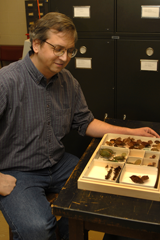
George Hammond
Title: Program Officer
Role: Science content specialist for the DeepThink program. He works with the education research and curriculum development teams to design science exploration activities for 4th, 5th, and 6th grade curricula. He also helps to design and build the technological tools critical to those student activities, including identification guides, the Critter Catalog, and Cybertracker and communication tools. George wrote the Invert I.D. Guide.
Background: George has a Master of Science degree in Biology from the University of Michigan, and a Bachelor of Arts in the same field from Pomona College. He is particularly interested in host-parasite ecology, and has done field research with insects and mites. He has 10 years experience teaching undergraduates.
George started working for the Animal Diversity Web in 2001, helping to guide the design and development of this important natural history database for use in education and research.

Ashima Mathur
Title: Graduate Student Research Assistant
Role: Member of curriculum development team, creates instructional material for fourth, fifth, and sixth grades. She also assists in supporting several schools where these curricula are implemented.
Background: Ashima is a doctoral pre-candidate in Science Education. In 2006 she earned a Bachelor of Science degree at Tufts University, where she studied biology and child development. Her senior thesis focused on the use of networked virtual communities to promote active citizenship in youth.
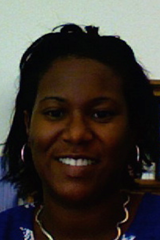
Tanya Cleveland-Solomon
Title: Graduate Student Research Assistant
Role: Tanya is a member of the curriculum development and assessment teams for the Deep Think Project, that develops science exploration activities and assessments for 4th, 5th, and 6th graders.
Background: Tanya has a Master of Science degree in Education (Learning Technologies) from the University of Michigan, and a Bachelor of Science in Chemical Engineering from Drexel University. She is close to completing her Ph.D. in Learning Technologies with a concentration in Scientific Literacy from the University of Michigan. Before coming to Michigan, she worked as an engineer in the auto and chemical industries for six years, and participated in educational outreach programs for professional engineering organizations.
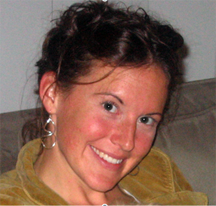
Shannon McGrath
Title: Research Assistant
Role: Shannon is a member of the curriculum development team and creates instructional material for fourth, fifth, and sixth grades. She also assists in supporting several schools where these curricula are implemented.
Background: Shannon has a Masters of Science degree in Curriculum and Instruction from Concordia University, a Bachelors of Science in Elementary Education from the University of Wisconsin, and is a certified as a K-8 teacher. Before coming to Michigan, she worked as a fifth and sixth grade elementary teacher.



